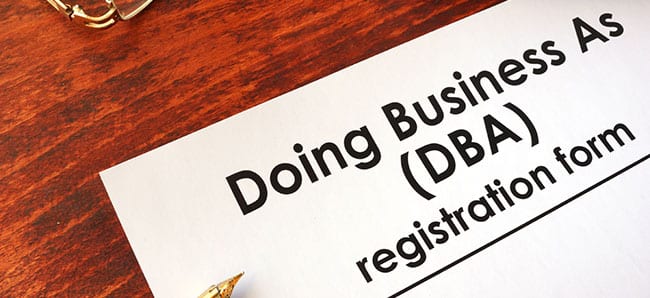Starting and running a business can be a complex endeavor. It’s important to consider whether you need to register a trade name or not, and it’s equally important to ensure that it’s registered correctly. A trade name can also be called an assumed name, a DBA, or a fictitious name. It is the name under which a company does business. It’s important for every business owner to understand what a trade name is and why it’s necessary to register one, if your brand name is different from the name you used for your state registration.
Let’s take a look at what exactly trade names are, and why they are so important.
What is a Trade Name?
A “Trade Name”, also known as a DBA or an assumed or fictitious name, is any name that does not include the legal name of the person or entity that owns the business. For example, if your name was “John Smith” and you own a sole proprietorship called “John Smith Consulting,” then “John Smith” would be your legal name and “Consulting” would be your business name. Most states require you to register “John Smith Consulting” as a DBA or trade name. The purpose of registering a trade name is to distinguish yourself from other businesses with similar names, in order to protect your brand and identity, and to meet legal requirements. From a legal standpoint, the state wants to know who to go after or sue, in instances of a lawsuit or other issue — which is why almost all states require trade name registrations.
Why is a Trade Name Important?
Registering a trade name enables you to separate yourself from other businesses with similar names or operating in the same industry. This helps you avoid confusion among customers and potential customers, who could otherwise be confused by businesses with similar names or services. Additionally, it helps protect your brand identity as well as your intellectual property rights (such as copyrights and trademarks). Furthermore, if you ever need to open up shop in another state or country, an already established trade name makes it easier for other entities, like banks and suppliers, to recognize you as legitimate business owners.
Having an established trade name may help you qualify for certain tax benefits, such as deductions for start-up costs, associated with launching your business venture.
Finally, if you are in a state that requires registration of a trade name and you don’t register your trade name, you run the risk of additional liability in a lawsuit. Such liability could come about either from damages permitted under your state’s fictitious name statute, or a plaintiff trying to argue attorney’s fees, court costs and possible sanctions for trying to “hide your identity” and frustrating the legal process in court.
How Difficult is it to Register a Trade Name?
It’s very easy and inexpensive to register a DBA (or trade name). Follow these simple rules:
- Already have a Corporation or LLC, and just want to advertise without the “LLC” or “Inc”? You don’t need to register a trade name to do that.
- Are you operating as a sole proprietor? You probably need to register a trade name, even if it’s very close or similar to your actual legal name. Only if you’re doing business as your exact legal name, can you avoid registering as trade name.
- Finally, if you are operating as a sole proprietor, consider forming a LLC instead. Aside from providing the registration you need for your trade name, a LLC an also provide a number of other benefits, including liability protection, survivability, tax benefits and more.
In conclusion, registering a trade name is an important step for any new business owner looking to differentiate themselves from their competition while protecting their brand identity and intellectual property rights. Furthermore, it provides tax benefits while making it easier for customers and suppliers alike to recognize them as legitimate entities in their respective industries. Ultimately, understanding what exactly constitutes a “trade name” will help ensure that any new business venture starts off on solid footing!

Get Started Today
Law 4 Small Business. A little law now can save a lot later. A Slingshot company.




